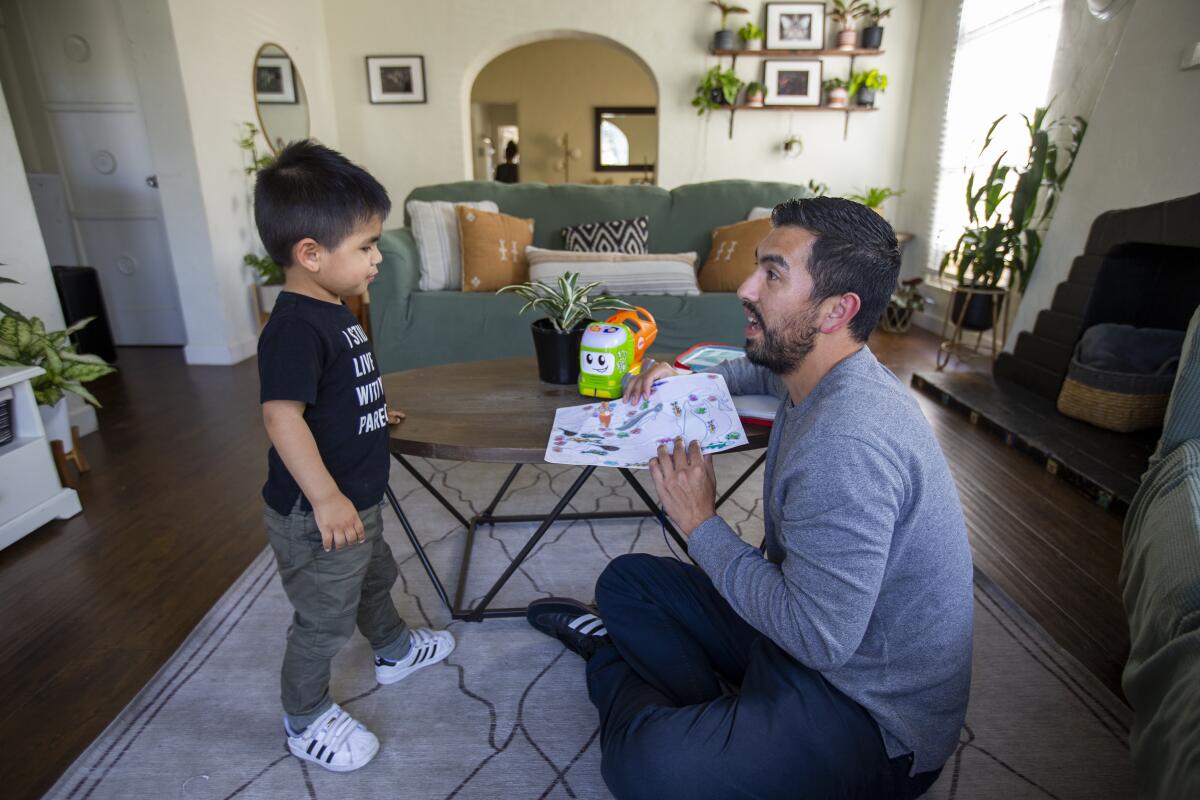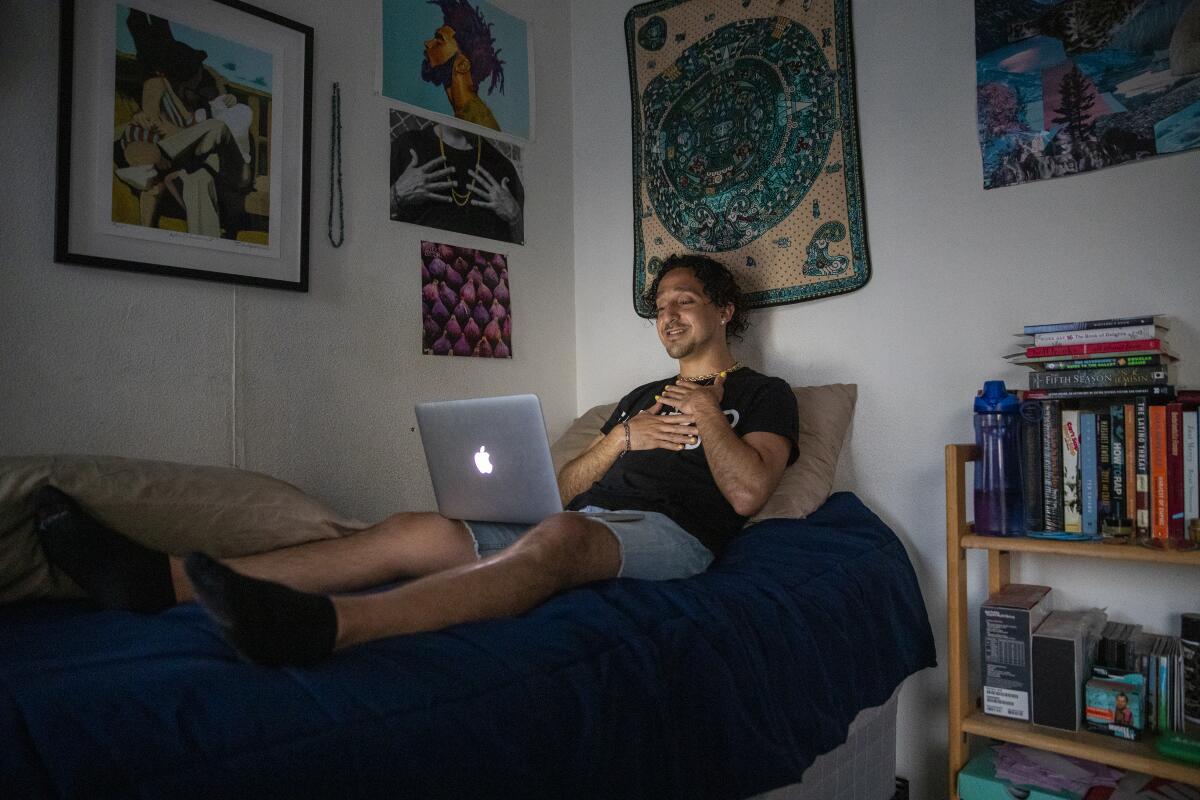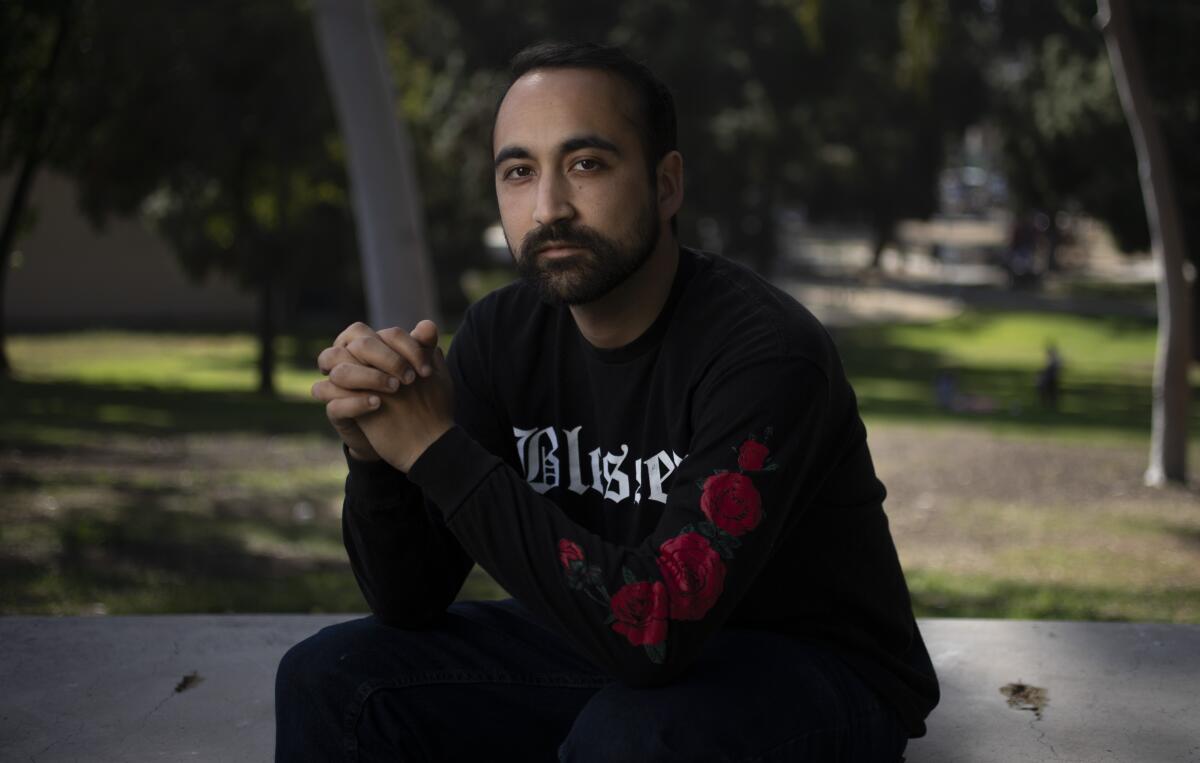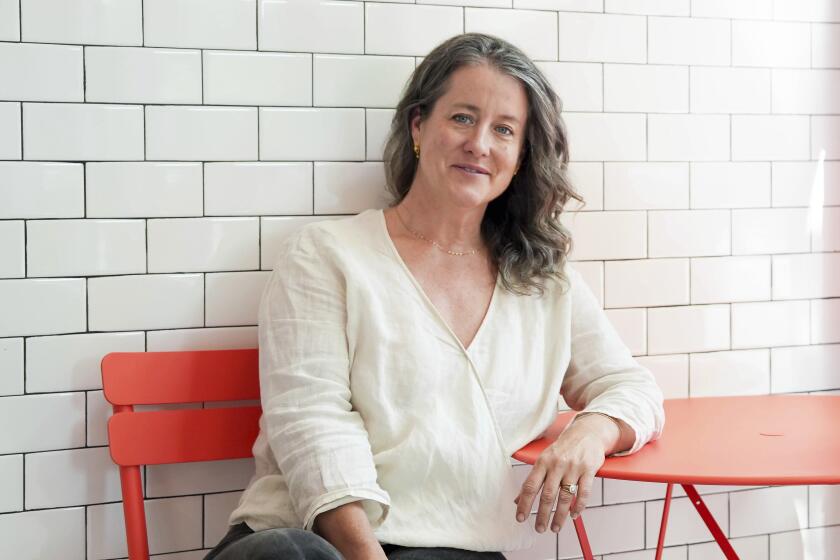How the men of Bloom Homie are redefining masculinity in L.A. — and beyond

Before COVID-19 ravaged the globe, Figgy Baby hosted bimonthly conversations among friends on such topics as violence against women, homophobia and mental health.
The local rapper, who uses they/their/them pronouns, dubbed the group “Healing Masculinity” and welcomed “anyone who identifies with manhood” to their apartment in L.A.’s Historic Filipinotown.
Eric Eztli, a poet and high-school English teacher, always left the gatherings in a buoyant mood. Eventually, he brought along his friend Rudy Torres, a photographer and indie-rock artist.
Longing to take those conversations beyond Figgy Baby’s apartment, Eztli suggested launching a joint Instagram account. His friends agreed.
They called it Bloom Homie. “This page is meant to inspire other men to be soft, be courageous, be emotional, be truthful, and be bold,” they wrote in the caption to their first post in February 2019. At first, only a few followers trickled in. Then hundreds. Then thousands more.
And then the pandemic hit. Gathering in person at Figgy Baby’s apartment became impossible, so the healing circle migrated to Zoom. They feared a decline in participation. At first, the group did dwindle.
But with the help of social media, Bloom Homie’s founders managed to stay afloat. Bolstered by more than 4,500 followers on Instagram, they’re now focused on figuring out how to amplify their reach.
Poetry brought them together. Four years ago, Figgy Baby took the stage at Alivio Open Mic, a monthly showcase of poets and musicians in Bell.
Eztli, who founded Alivio in his parents’ garage in 2013, sat in the audience, listening intently as the rapper shared a poem describing the type of father they’d like to be.
Eztli was transfixed: “Who is this?” he thought.
He approached Figgy Baby after the performance, and they quickly forged a bond. Soon after, Eztli was a regular at the rapper’s home.
When COVID-19 hit, spoken-word venues like Da Poetry Lounge and Olivia Open Mic went online, keeping verse flowing and raising funds for artists.
Eztli, who has become a talent scout for poets across southeastern Los Angeles, likewise met Torres at an open mike night at Cruzita’s Deli in Huntington Park about four years ago.
Because he’s a musician, Torres assumed he would be performing with his guitar when the shop owner asked him to participate. “But when I get there, I see a poster that says, ‘Rudy Torres: featured poet.’ And I’m, like, what?”
He frantically searched through notes in his phone for something that “seemed poetic” and landed on a journal entry about his father. As Torres read before the crowd, he did his best not to look nervous.
“I saw Eric standing in the back,” he said. “And when I finished, he came up to me, he affirmed me and he invited me to his open mike. That had never happened to me in my life.”
Bloom Homie’s founders bring this same energy to their Instagram account, where their camaraderie shows up in their comments to one another.
Some of their posts are silly, featuring memes that take stabs at gender stereotypes. On other occasions, they share articles or videos about what they see in the news. In May 2019, for instance, Eztli posted a video speaking out against stringent anti-abortion legislation in Alabama, which made performing the procedure punishable by up to life in prison — with no exceptions for rape victims.
“That’s just going to set up a whole tortuous life for that person,” Eztli said in the video, holding his then-infant son in his arms.
Sci-fi-loving Figgy Baby often posts tender messages to their followers using the alias “Octavia Butler’s Favorite Rapper.” Some of them read like mantras. “I’m here with you,” they wrote in March 2021. “Let’s forgive ourselves daily, learn to hold ourselves accountable, and bask in how far we’ve come.”
Every once in a while, the Bloom Homie founders share deeply personal experiences. A poem that accompanies one of Torres’ photographs, titled “What you taught me,” is especially poignant. In it, the East L.A. native revisits the poem he read the night he met Eztli, examining his relationship with his father and reflecting on what he’s learned.
“It was in the heavy breaths you took and the hands you raised to my mother,” the poem reads. “It was in the manic voice I heard while she took it all in tears. It was in the night I hid behind my dresser, holding my sisters close while the cops came and pulled you to the ground. It was in the silence in the air that followed.”
“I still remember hiding behind that dresser with my sisters, crying and hearing my mom scream,” Torres told The Times. “And that moment, when I was, like, 8 years old, it changed my whole outlook on men and violence and love.
“Growing up, I kept telling myself I would never put a person through that, so I always navigated my relationships with caution, with intention and with respect — or so I thought.
“But then I started writing poetry. I started going to therapy. And when I started doing this healing work, I realized I was doing the same s— my dad would do. I was perpetuating those behaviors in my relationships, not physically, but emotionally. I recognized the pattern. I was emotionally abused, but I also did it back. And when I finally saw that, I was like, ‘I’ve got to stop this.’ So more therapy, more poetry. And honestly, poetry’s what saved me. That’s why I posted what I wrote, in case others feel the same.”
To protect one another from COVID-19, which has ravaged Black and Latino neighborhoods in Los Angeles, Figgy Baby opted to do the “Healing Masculinity” sessions on Zoom. Initially, they mourned the loss of in-person connections. Then they saw the platform’s potential.
Instead of bimonthly gatherings with a handful of folks huddled in their apartment, Figgy Baby now has weekly online meetings with up to 25 participants from across L.A. County — including Cerritos, El Sereno, East L.A., Los Feliz, Santa Clarita, South L.A., Van Nuys and Whittier. In fact, people now regularly tune in from as far north as Oakland, along with a few participants in the Midwest, the South and the East Coast.
They come together every Tuesday at 7 p.m. for two-hour sessions. Sometimes, when there’s a lot to discuss, the healing circle can run long. When that happens, East Coast attendees stay put, even though for them it’s well past midnight.
Figgy Baby cherishes this pandemic-induced outgrowth. They’ve reached out to participants outside California to discuss becoming facilitators. Once it’s safe for people to gather in person, they’d love to see those participants running their own local groups.

Accessibility is central to the Bloom Homie mission. Though the founders are all college graduates — with degrees from Brown, Cal State Long Beach and Hampshire College — they aim to reach people from all walks of life.
“We’re trying to make this palatable for everybody,” said Torres. “Not everyone gets to take women or gender studies classes at a university.”
“‘Calling in’ instead of ‘calling out’” is part of this endeavor, said Figgy Baby. “No one’s born knowing terms like ‘the patriarchy’ or ‘toxic masculinity,’ so when questions about that come up, I’m happy to explain.”
“Nadie sale regañado (No one comes out scolded),” added Eztli, who maintains that discord can be an opportunity for learning and mutual understanding.
Of course, social media interactions aren’t always smooth. Bloom Homie’s founders sometimes hear from people who aren’t too pleased with their work, most often men.
For instance, after Eztli posted, “Men, don’t let patriarchal forms fool you. Your character is more valuable than the money you have,” detractors weighed in. Some faulted women for “fetishizing men with money”; others insulted Eztli directly. When interactions like this occur, the trio has to weigh whether it’s worth engaging.
If a contrarian “is prepared to have a mature conversation, we’re here for that,” Eztli said. “But if someone wants to be rude and degrading, then no. I’m not going to be arguing with all these guys across the U.S.”

For others, the Bloom Homie posts have been transformative.
“I’m from an older, more ‘traditional’ group of people, so this is all new to me and good to learn,” wrote one follower in the comments section to a post on trans-inclusive language.
“This is so real,” another follower commented after Bloom Homie shared a Washington Post article titled “No Game Days. No Bars. The Pandemic Is Forcing Men to Realize They Need Deeper Friendships.”
“As a young man,” he added, “I realized that ... the only time I would talk about my feelings with my guy friends was when we were drunk and up late ... When I found out my wife was pregnant, the first thing I did was start an email chain with my guy friends. It’s been instrumental to my mental health.” He then asked if he could join Figgy Baby’s healing circle.
To build on what it has created, Bloom Homie has partnered with like-minded organizations, including the East Los Angeles Women’s Center, which offers a 12-week program for fathers who want to cultivate healthy relationships with their loved ones. Because of his experience working with youth, Eztli hosts meetings akin to “Healing Masculinity” for high school students at A Place Called Home, a nonprofit based in South Central Los Angeles.
He’s also teamed up with Latinx Parenting, a platform that promotes nonviolent childcare. Together, they cohosted a book club on “All About Love,” a text by Black feminist activist bell hooks.
“I recommend that book very passionately to all men I run into now,” said Eztli. “I’m, like, ‘Dude, read it. It’ll make you think about your childhood, your parents, who you’re going to be.’”
Reflecting on the past matters to the Bloom Homie founders. Looking back on his upbringing, Eztli recalled that all he was taught about interacting with the opposite gender was “respeta a las mujeres.”
“But, like, what does ‘respect for women’ even mean?” he asked. “What does that look like day to day? And what about when we get rejected?”
Figgy Baby, who was inspired to launch the healing circle amid the start of the #MeToo movement, think it’s crucial to unpack the ways in which sexism is harmful to all.
“Part of it was acknowledging my own participation in that toxicity, the ways that I’ve inflicted hurt on other people in my life,” they told The Times. “But the patriarchy is definitely not good for men, either.”
Eztli’s wife, Jennifer Barajas (no relation to the writer), supports Bloom Homie’s mission and especially appreciates that it provides a space to re-imagine parenting.
“When we decided to get pregnant,” she said, “one of the first things we agreed on was that we would not perpetuate gender norms.”
For their toddler, Elías, she said, this means that they are “really conscious about allowing him to be upset and cry and making sure that we don’t say, ‘Boys don’t play with Barbies’ or whatever. We want to completely eliminate that language in our journey through parenthood.”
Meeting Eztli, Barajas added, also compelled her to question her own preconceptions surrounding masculinity.
The couple first crossed paths about eight years ago, as college students protesting the agrochemical company Monsanto. “And at first, I was like, ‘Who’s this guy, and why is he always talking about his feelings?’” she said.
Amid the pandemic, Eztli and Figgy Baby also started a podcast, “Get Ya Boi,” an offshoot they’ve found hard to keep up.
The founders are all stretched pretty thin, juggling careers and family obligations. One of their loved ones was hospitalized last winter after being infected with the novel coronavirus, so they continue to play it safe and meet online.
Still, they’re committed to the work.
“It’s a labor of love,” said Eztli, “but it’s a bell hooks type of love, not that cheesy fairy-tale stuff.
“She pretty much says that love is our commitment to the spiritual growth of people in our lives. And I want to be that as much as I can.”
The biggest entertainment stories
Get our big stories about Hollywood, film, television, music, arts, culture and more right in your inbox as soon as they publish.
You may occasionally receive promotional content from the Los Angeles Times.




